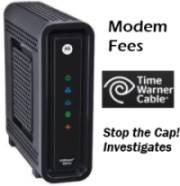 Time Warner Cable customers who purchased their own cable modems to avoid the company’s $8 monthly rental fee will effectively be forced to indirectly pay those fees once again if Charter Communications wins approval to buy the cable operator.
Time Warner Cable customers who purchased their own cable modems to avoid the company’s $8 monthly rental fee will effectively be forced to indirectly pay those fees once again if Charter Communications wins approval to buy the cable operator.
A major modem manufacturer, Zoom Telephonics, has asked the Federal Communications Commission to reject Charter’s buyout of Time Warner Cable and Bright House Networks because it will hurt cost-conscious consumers that invested in their own equipment to avoid costly modem rental fees.
Zoom’s argument is that Charter builds modem fees into the price of its broadband service and offers no discounts to consumers that own their own equipment. At least 14% of Time Warner Cable customers have purchased their own modems and are not charged the $8 rental fee. Charter has promised not to charge separate modem fees for three years after its acquisition deal is approved, but that also means the company is building the cost of that equipment into the price of broadband service.
Zoom has an interest in the outcome because Charter has yet to approve any Zoom cable modem model for use on its network. Time Warner Cable has certified at least one Zoom model in the past. Assuming the buyout is approved, consumers would have a disincentive to buy Zoom cable modems (or those manufactured by anyone else) because the equipment will be provided with the service.
Zoom has tangled with Charter before, most recently in the summer of 2014 when it criticized Charter’s policy forbidding new customers from using their own modems with Charter’s service. From June 26, 2012 until Aug. 22, 2014, Charter’s website stated, “For new Internet Customers and customers switching to our New Package Pricing, we will no longer allow customer owned modems on our network.”
Zoom claims Charter modified that policy three days before a key FCC filing deadline that could have eventually brought regulator attention on the cable operator. But Zoom remains unhappy with how Charter deals with the issue of customer-owned equipment.
“Charter has still not adopted certification standards that are open to Zoom and other cable modem producers, nor has Charter yet made a commitment for timely certifications under this program,” Zoom claimed in the summer of 2014. “Of the 17 cable modems Charter shows as qualified for customer attachment to its network, not one is stocked by leading cable modem retailers Walmart, Staples, and Office Depot and not one has 802.11ac wireless capability. Charter still does not separately list the cost of its leased modems on customer bills, and Charter does not offer a corresponding savings to all customers who buy a qualified cable modem and attach it to the Charter network.”
 Zoom wants Charter to be required to offer consumers that own their own equipment a tangible monthly discount for broadband service as a condition of any merger approval.
Zoom wants Charter to be required to offer consumers that own their own equipment a tangible monthly discount for broadband service as a condition of any merger approval.
“The Communications Act says that cable companies should sell cable modem leases and Internet service separately,” Andrew Jay Schwartzman, a professor at Georgetown University Law Center who is representing Zoom, told the Los Angeles Times. “By combining the prices, Charter’s customers are deprived of the ability to purchase advanced cable modems and save the cost of monthly rental fees.”
Charter argues the Act only covers set-top boxes used for cable television service, not modem fees. Charter also claims its introductory prices are lower than what most cable companies charge, modem fee or not.
“Customers will benefit from Charter’s pro-customer and pro-broadband model with transparent billing policies,” Tamara Smith, a Charter spokeswoman, told the newspaper. “It features straightforward, nationally uniform pricing with no data caps, no usage-based pricing, no modem fees, no early termination fees and does not pass on federal or state Universal Service Fund fees to customers.”
But Charter is only guaranteeing those customer-friendly policies for three years, after which it can raise prices and add fees at will.


 Subscribe
Subscribe
The thing that I hate about the Modems that you get from the ISPs isn’t just about the High cost of them. They also effectively have the keys to change settings, Spy on you, Throttle your speed, etc. I will not ever use a Modem given to me by an ISP ever and will move away to a different area if I’m ever forced to. Cant wait for the sh** the ISPs have been doing to come around and bite them on the ass.
In reply to nkjnkjnkj7978 — there are plenty of reasons to detest cable-company modems, but the sad fact is that your ISP can already do all the things you mention without needing their modem in your house. They can, and often do, enact deep-packet inspection of your traffic, hijack failed DNS lookups, throttle your speed, and other things– all upstream of the cable modem. The way around that is to get a good VPN service and route your traffic through that. Now, when the cable company supplies a router/wifi access point as well as a modem, that gives them more… Read more »
what date are they removing the $10 modem fee from twc bill since they are charter now?